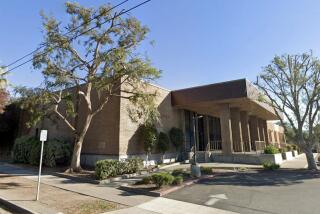Bank Told to Cut Fee on Bad Checks
- Share via
OAKLAND — A judge has ordered Bank of America to slash what it charges customers who mistakenly deposit bad checks, in a victory that is the first of its kind for consumers and businesses that unwittingly receive checks that bounce.
Acting in a suit brought by the California Grocers Assn., Alameda County Superior Court Judge John Sutter accused Bank of America of gouging customers and ordered that it cut charges for depositing bad checks from the current $3 to $1.73 by Aug. 1.
Lawyers for Bank of America, the largest bank in California and one that handles a third of all checks in the state, are seeking a stay of Sutter’s order until after an appeal. The ruling issued last week apparently is the first of its type in the nation.
“It’s of big concern. We’ll be in there swinging on the appeal,” said Chris Chenoweth, lawyer for the California Bankers Assn. He called the ruling “awful,” and said it invokes “economic theories discredited everywhere but maybe Albania.”
“This ruling is trying to turn banks into a public utility,” he added. He said banks impose such fees in part as a “disincentive to write bad checks,” adding that grocers who take bad checks are guilty of slipshod practices.
Don Beaver, president of the 8,000-member California Grocers Assn., said grocers in California paid out $38.9 million in bounced-check fees last year. Hailing the ruling as a victory, Beaver said some small grocery stores pay up to 2% of their income on bank fees for bad checks.
“While the banks are making millions, businesses that deposit (bad) checks are losing millions,” Beaver said. “We don’t think that’s right.”
California banks charge $2 to $5 to customers who deposit checks that bounce--the focus of the suit. Banks charge an additional $10 to $15 to people who write checks that bounce. Fees charged specifically for writing bad checks were not addressed in the suit.
In his ruling, Sutter found that Bank of America’s cost of processing so-called “deposit item returned” checks is no more than $1.73, a figure he said includes “reasonable profit,” and is “probably high.”
Sutter did not order that the bank pay restitution for past charges, but he decreed that the bank will have to repay the plaintiffs for any excess funds they collect after Aug. 1.
Sutter noted that many major customers, including large supermarket chains, have negotiated fees of $1.50 per bad check, but that most customers “must accept the bank’s terms on a ‘take it or leave it basis.’ ”
The ruling was a sweet victory for the grocers’ lawyer, Manuel G. Abascal. Working from a warehouse in an industrial part of Berkeley, Abascal repeatedly has taken on the state’s biggest banks over banking fees.
“I don’t like bullies,” Abascal said, explaining why he has pursued banks.
He estimates that banks in California impose a total of $700 million a year in charges to customers who write bad checks and deposit checks for which there are insufficient funds.
Abascal turned his attention to banks when, as a law student, he and his wife had to pay for several checks they had bounced. Later, while working for a San Francisco law firm in 1970s, he helped originate class-action suits against banks over bounced check charges.
After he left the firm, lawyers who retained control of the suits settled them in 1987 and 1988. He and some other plaintiffs’ lawyers fought the deals, contending that they gave consumers little relief while banks were allowed to continue charging hefty fees for bounced checks.
Abascal failed to persuade the courts to overturn the settlements. But he pressed other cases, including one against Bank of America for canceling his personal account because he had filed what the bank said was an unfounded suit against it. He lost that case.
Under Sutter’s ruling, Abascal estimated, banks’ revenue will be reduced by $12 million to $15 million. He said that Sutter could have set the fee at less than 80 cents.
“I think they’re lucky,” he said.
More to Read
Inside the business of entertainment
The Wide Shot brings you news, analysis and insights on everything from streaming wars to production — and what it all means for the future.
You may occasionally receive promotional content from the Los Angeles Times.










